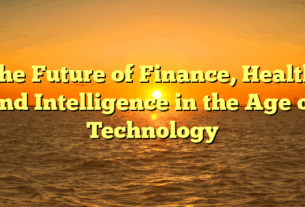In today’s rapidly evolving world, four major forces — finance, technology, intelligence, and health — are shaping the way we live, work, and interact with each other. These domains are not isolated; rather, they influence and complement one another in significant ways, creating new opportunities, challenges, and innovations. This article will explore how each of these forces impacts our society and what the future holds for them.
1. The Impact of Finance on Global Development
The financial world has evolved dramatically in recent years. Emerging technologies like blockchain, artificial intelligence, and machine learning are reshaping the financial landscape. These innovations have not only made financial transactions faster and more secure but also introduced entirely new ways to manage wealth, from cryptocurrency investments to robo-advisors. Financial institutions must adapt to these changes to meet the needs of a digital-savvy generation.
As we look ahead, the role of finance in fostering innovation cannot be underestimated. The availability of capital is essential for startups and emerging industries, particularly in tech and healthcare. However, the future of finance faces challenges such as cybersecurity threats, financial inequality, and the regulatory implications of new technologies. Governments and institutions will need to adapt their policies to ensure that financial systems remain resilient and inclusive, especially in light of global crises like pandemics and economic recessions.
2. The Role of Technology in Shaping Our Future
Technology has become an integral part of modern life. With advancements in artificial intelligence, machine learning, blockchain, and virtual reality, technology continues to change the way we live, work, and communicate. The digital transformation is disrupting industries and pushing companies to innovate and adapt. While copacobana99 brings numerous benefits, it also presents challenges, including ethical dilemmas, data privacy concerns, and the potential for widening the digital divide.
Technology is not just transforming industries; it is also enhancing our well-being. In healthcare, the rise of telemedicine, health apps, and data analytics is improving patient care and making healthcare services more accessible. Wearables and AI-powered devices can monitor patients’ health in real-time, providing valuable data for doctors and patients alike. The convergence of healthcare and technology promises a future where medical advancements are faster, more personalized, and more affordable.
3. The Rise of Artificial Intelligence and Intelligence Systems
Artificial intelligence (AI) is one of the most powerful technologies of the 21st century, with the potential to revolutionize industries ranging from finance and healthcare to education and entertainment. AI is being used to automate routine tasks, analyze vast amounts of data, and improve decision-making processes. In finance, AI algorithms are being used to predict market trends and optimize investment strategies. In healthcare, AI is enabling more accurate diagnoses and personalized treatment plans.
While AI holds tremendous promise, it also presents significant ethical challenges. Issues related to data privacy, surveillance, and algorithmic bias are just a few concerns that need to be addressed as AI systems become more pervasive. Additionally, the displacement of jobs by AI and automation is a growing concern, requiring new approaches to workforce training and social support. Policymakers, developers, and ethicists must work together to ensure that AI is developed in a way that benefits society as a whole.
4. Health and Well-being in the Digital Age
The role of technology in healthcare is growing rapidly, particularly in the realm of preventative care. Wearables like smartwatches and fitness trackers enable users to track vital statistics such as heart rate, sleep patterns, and physical activity. Additionally, telemedicine has made healthcare more accessible by allowing patients to consult with doctors remotely. As technology continues to evolve, we can expect even more innovative solutions that enhance our well-being and improve health outcomes worldwide.
As technology continues to advance, healthcare delivery will become more efficient and equitable. Innovations such as telemedicine and digital health services are breaking down geographical and financial barriers to healthcare, making essential services more accessible to people in remote areas or underserved communities. This transformation promises to improve health outcomes and promote a more inclusive global healthcare system.
Conclusion
Finance, technology, intelligence, and health are powerful forces driving global progress. While they offer significant potential for improving our lives, they also present challenges that require careful management. By embracing these innovations and addressing the associated risks, we can pave the way for a brighter, more inclusive future for everyone.


